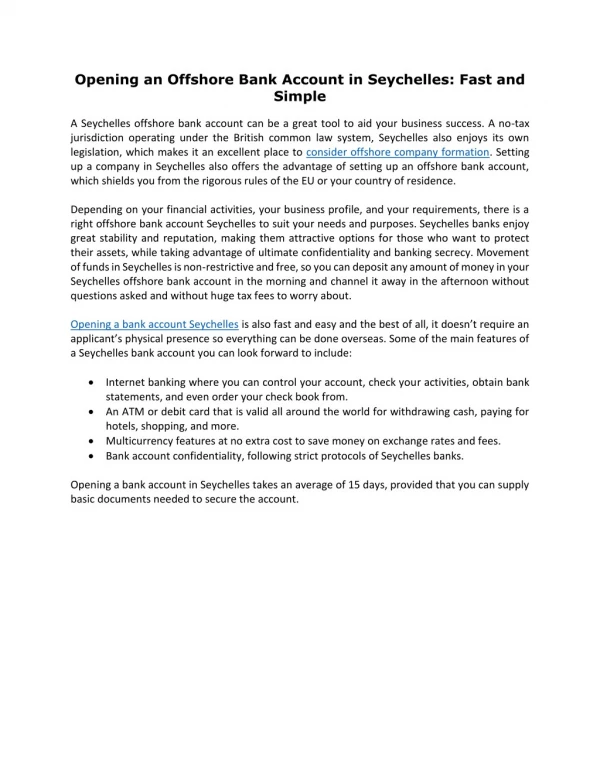Exploring the Solutions Offered in Offshore Firm Formations: What You Required to Know
Offshore firm formations provide a range of services designed to facilitate company success while guaranteeing compliance with lawful needs. These solutions can include firm registration, legal suggestions, and arrangements for personal privacy via candidate directors. Furthermore, considerations around tax optimization and possession security are critical. Comprehending these aspects can greatly influence one's decision-making process. The intricacies of choosing the right jurisdiction and guiding with regulations increase further concerns. What should one think about following?
Comprehending Offshore Business Structures
What specifies an overseas company structure? An overseas business is normally registered in an international territory, often identified by favorable regulative settings and confidentiality. These structures are created to give legal separation between the business's assets and its owners, allowing a variety of monetary and operational benefits. Offshore companies can be developed as numerous types, consisting of restricted liability firms (LLCs), corporations, or trust funds, depending on the regulative structure of the picked jurisdiction.
Trick features of these frameworks include enhanced personal privacy, property security, and simplicity of worldwide service transactions. Furthermore, they often require minimal local visibility and can promote the administration of investments across borders. The option of a details overseas jurisdiction can considerably influence the operational capacities and conformity requirements of the company. On the whole, recognizing the ins and outs of overseas business frameworks is crucial for financiers and entrepreneurs seeking to optimize their service strategies.
Tax Obligation Advantages of Offshore Business
Offshore companies supply significant tax benefits that can enhance success and monetary efficiency for company owners. One of the main advantages is the capacity for decreased business tax prices, which can be significantly less than those in the proprietor's home country. Several offshore territories provide tax rewards, such as tax holidays or exemptions on particular kinds of income. In addition, overseas companies may benefit from positive tax obligation treaties, enabling the decrease or elimination of withholding tax obligations on returns, aristocracies, and interest. This can lead to raised capital and much better reinvestment chances. In addition, some offshore entities can run under a territorial tax obligation system, which just taxes revenue created within that jurisdiction. This structure can be especially useful for companies participated in worldwide profession or on the internet services, allowing them to maximize their tax obligation responsibilities while preserving conformity with worldwide laws. In general, these tax benefits can considerably add to lasting monetary success.
Personal Privacy and Discretion Features
How can organization owners guard their delicate info while gaining from worldwide chances? Offshore business formations provide robust privacy and discretion attributes that interest business owners looking for discernment (Offshore Company Formations). Numerous jurisdictions give nominee services, enabling individuals to assign 3rd parties as supervisors or shareholders, thereby concealing their identities from public records
On top of that, strict data security legislations in various offshore territories assure that delicate information stays private. Offshore companies usually gain from improved banking personal privacy, with laws that shield customer identities and monetary transactions.
Furthermore, using personal addresses for registered workplaces lessens exposure to public analysis.
These personal privacy procedures allow local business owner to run with greater self-confidence, knowing their delicate data is secure. By leveraging these attributes, business owners can concentrate on tactical growth chances without the constant problem of info exposure.
Possession Defense Methods
While guiding through the complexities of worldwide organization, business owners should prioritize asset defense to protect their wealth from possible threats. Offshore company formations use durable strategies for alleviating exposure to lawful cases, financial institution actions, and political instability. One reliable approach entails establishing a restricted obligation company (LLC), which separates individual assets from business liabilities, consequently supplying a guard versus legal actions.
Furthermore, entrepreneurs can utilize counts on to hold properties, ensuring they stay protected from financial institutions and lawful disputes. Jurisdictions with strong property defense legislations, such as Nevis or the Cook Islands, are usually favored for their favorable regulations. Carrying out appropriate insurance coverage and expanding investments further enhances safety and security, decreasing vulnerability to market fluctuations. In general, making use of these methods within an offshore framework not just advertises riches preservation but also promotes long-lasting financial stability, enabling entrepreneurs to concentrate on growth and advancement without unnecessary issue over asset exposure.

Opening Up Offshore Financial Institution Accounts
Opening up overseas savings account includes comprehending the numerous account types offered, which can deal with various economic needs. In addition, the documentation procedure is necessary, as it usually calls for certain forms of identification and proof of house. This introduction will clear up the options and demands for people and organizations seeking to establish overseas financial connections.
Account Kind Provided
Offshore financial institution accounts been available in different kinds, each designed to satisfy different financial demands and goals. Individual accounts are tailored for people seeking privacy and property security, while corporate accounts facilitate organization deals and monitoring of company funds. Multi-currency accounts are preferred among worldwide investors, enabling transactions across various currencies without extreme conversion charges. Additionally, savings accounts supply find more info rate of interest on deposits, attracting those looking to expand their assets firmly. Some banks additionally supply investment accounts, providing clients accessibility to various financial investment chances. Each account type may feature unique advantages and features, allowing clients to pick the one that aligns best with their financial approaches and purposes. Comprehending these options is fundamental for reliable offshore financial.
Needed Paperwork Process
To successfully open an overseas bank account, prospective clients must prepare a set of details records that please regulative needs. This commonly consists of a valid ticket or government-issued recognition to validate identification. Clients are additionally required to give evidence of house, such as an energy costs or copyright, dated within the last three months. Furthermore, a thorough description of the source of funds is needed to assure conformity with anti-money laundering policies. Some banks might request an organization strategy or recommendation letters, specifically for company accounts. Each territory may have special demands; subsequently, seeking advice from with an expert in offshore solutions is advisable to identify all documentation is accurate and total, promoting a smoother account opening process.
Compliance and Regulatory Considerations
Steering the intricacies of compliance and governing factors to consider is vital for any type of entity going after overseas business developments. Entities must comply with different global and local regulations that regulate financial tasks, tax, and corporate administration. Trick laws usually include anti-money laundering (AML) laws, recognize your customer (KYC) protocols, and coverage requirements to ensure transparency.
Moreover, business must remain cautious regarding adjustments in regulation that might affect their operational condition. Failing to conform can cause severe charges, consisting of penalties or the dissolution of the firm. Involving with legal and monetary professionals that specialize in offshore guidelines can give essential assistance in steering through these complexities.
Additionally, comprehending the effects of tax obligation treaties and global agreements is fundamental for keeping compliance. Companies should prioritize developing durable compliance structures to minimize risks and assure long-lasting sustainability in their overseas ventures.
Picking the Right Offshore Territory
Just how does one determine one of the most appropriate overseas territory for business development? The selection Check Out Your URL of territory is essential and includes a number of aspects. One should analyze the lawful structure and guidelines governing firms in possible territories. Desirable tax obligation regimens, such as low or zero corporate taxes, are commonly a key factor to consider. Additionally, the political security and credibility of the jurisdiction play substantial duties in ensuring the defense of properties and conformity with international criteria.
The ease of access of banking services and the convenience of doing service ought to not be forgotten. A territory offering robust privacy stipulations can also be advantageous for those seeking privacy. Evaluating the expenses associated with business development, upkeep, and prospective legal charges is vital. By considering these variables, one can make an informed decision, guaranteeing that the picked offshore territory lines up with their organization objectives and operational demands.

Frequently Asked Inquiries
For how long Does the Offshore Business Formation Refine Typically Take?

The offshore business formation process commonly takes anywhere from a few days to numerous weeks. Offshore Company Formations. Aspects influencing this timeline include territory, documentation efficiency, and certain company associated with the formation procedure
What Are the Initial Costs Associated With Establishing up an Offshore Company?
The preliminary prices for establishing up an overseas firm can vary widely, commonly encompassing registration costs, legal expenses, and added fees for services like bank account setup and compliance, frequently amounting to several hundred to several thousand bucks.
Can Individuals Form Offshore Companies Without Professional Aid?
Individuals can technically create overseas companies separately; nevertheless, they usually come across intricate legal and governing requirements. Offshore Company Formations. Expert aid is recommended to navigate these challenges efficiently and assure compliance with appropriate legislations and guidelines
What Records Are Required for Offshore Business Enrollment?
The documents needed for offshore company enrollment generally include identification evidence, a thorough company strategy, evidence of address, and, in some territories, a statement of beneficial possession and resolutions from directors.
Exist Ongoing Maintenance Costs for Offshore Firms?
Recurring maintenance charges for overseas business are commonly required to ensure compliance with local regulations. These costs might consist of annual renewal charges, signed up representative solutions, and bookkeeping, varying by jurisdiction and specific business framework.
